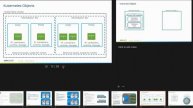Packing & Unpacking Of Python Tuples | Python 4 You | Lecture 124
Packing and Unpacking of Tuples in Python
Tuples are a versatile and fundamental data structure in Python. They allow you to store a collection of values in an ordered and immutable manner. One of the interesting and useful features of tuples is the concept of packing and unpacking. In this discussion, we will explore what packing and unpacking of tuples mean, how they work, and their practical applications in Python.
Packing Tuples
Packing a tuple is the process of collecting values together in a single tuple, where each value is separated by a comma. You can create a tuple by enclosing a sequence of values in parentheses. This is known as tuple packing. For example:
python code
my_tuple = 1, 2, 3, 'hello'
In this example, we've packed the values 1, 2, 3, and the string 'hello' into a single tuple my_tuple. You can access the elements of this tuple using indexing, just like you would with a list or any other sequence in Python.
Packing is a simple and natural way of creating tuples, and it's often used when you need to group related values together, such as storing coordinates, representing RGB color values, or bundling function return values into a single data structure.
Unpacking Tuples
Unpacking a tuple is the reverse process of packing. It involves extracting individual values from a tuple and assigning them to separate variables. To unpack a tuple, you simply provide the same number of variables on the left side of an assignment as there are elements in the tuple.
Here's how you can unpack a tuple:
python code
a, b, c, greeting = my_tuple
In this example, the values in my_tuple are unpacked and assigned to the variables a, b, c, and greeting. After this line of code, a will be 1, b will be 2, c will be 3, and greeting will be the string 'hello'. Unpacking is a powerful feature that allows you to work with the individual components of a tuple with ease.
Practical Use Cases
Packing and unpacking of tuples have several practical applications in Python:
Function Return Values: Functions often return multiple values as a tuple, which can be unpacked into separate variables to work with the results.
Swapping Values: You can swap the values of two variables without using a temporary variable by packing and unpacking them in a tuple.
python
Copy code
a, b = b, a
Iterating Over Sequences: Tuples can be used to iterate over the elements of a sequence, such as a list or a string.
python code
for element in my_tuple:
print(element)
Multiple Assignments: When you need to assign values to multiple variables, you can use tuple packing and unpacking.
python code
dimensions = width, height = 800, 600
Tuple Concatenation: You can concatenate tuples by packing them together and unpacking the result into a new tuple.
python code
concatenated_tuple = my_tuple + (4, 5, 6)
Returning Multiple Values: Functions that need to return multiple values can use tuple packing to bundle the results together.
python code
def get_coordinates():
x = 1
y = 2
return x, y
The ability to pack and unpack tuples provides a convenient and efficient way to work with multiple values in Python. It simplifies code and enhances readability, making your programs more expressive and concise.
Immutability and Safety
One important characteristic to note is that tuples are immutable, meaning their values cannot be changed once they are created. This immutability ensures data integrity and prevents accidental modification of values during the packing and unpacking process.
In summary, packing and unpacking of tuples in Python are essential concepts that enable you to work with multiple values efficiently and safely. These operations simplify code, improve readability, and are widely used in various programming scenarios, from simple variable assignments to more complex function returns and data manipulation. Understanding how to pack and unpack tuples is a valuable skill for any Python programmer.#python4 #pythontutorial #pythonprogramming #python3 #pythonforbeginners #pythonlectures #pythonprograms #pythonlatest #rehanblogger #python4you #pythonlatestversion #pythonlatestversion Learn python3.12.0 and latest version of python3.13. If you are searching for python3.13.0 lessons, you are at the right place as this course will be very helpful for python learners or python beginners.
Видео Packing & Unpacking Of Python Tuples | Python 4 You | Lecture 124 автора Python кампус
Видео Packing & Unpacking Of Python Tuples | Python 4 You | Lecture 124 автора Python кампус
Информация
2 декабря 2023 г. 13:27:26
00:02:33
Похожие видео






![[Arm DevSummit - Workshop] Cloud Native Networking and Service Mesh with KubeEdge/Istio/Envoy/Ciliu](http://pic.rutubelist.ru/video/8b/a9/8ba957359280e7da8ae5e1ef95be03a6.jpg?size=s)















